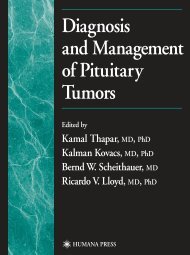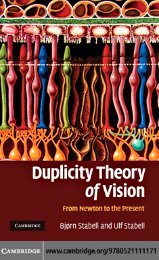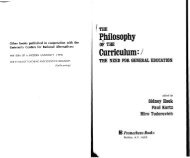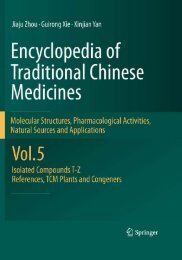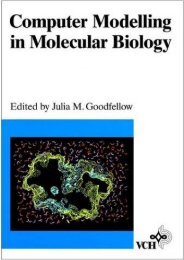Page 2 Lecture Notes in Computer Science 2865 Edited by G. Goos ...
Page 2 Lecture Notes in Computer Science 2865 Edited by G. Goos ...
Page 2 Lecture Notes in Computer Science 2865 Edited by G. Goos ...
You also want an ePaper? Increase the reach of your titles
YUMPU automatically turns print PDFs into web optimized ePapers that Google loves.
Analyz<strong>in</strong>g Split Channel Medium Access Control Schemes 139The <strong>in</strong>ferior throughput performance of split-channel schemes is due to thefact that the control subchannel cannot generate a successful channel reservationdialogue dur<strong>in</strong>g the period of time when data packets are transmitted onthe data subchannel. The randomness of these contention resolution periods requiresa larger portion of the available bandwidth to be allocated to the controlsubchannel, so that long wait<strong>in</strong>g time on the data subchannel would be unnecessary.However, as the overall throughput of split-channel schemes is limited<strong>by</strong> the capacity of the data subchannel, such allocation of a larger bandwidthto the control subchannel results <strong>in</strong> significant loss of performance of the datasubchannel.Even though our results are derived for MAC protocols that are based onthe RTS/CTS dialogue, these results can be applied to other split-channel MACschemes as well. In particular, these results can be useful for system eng<strong>in</strong>eer<strong>in</strong>g<strong>in</strong> evaluat<strong>in</strong>g the advantage and disadvantage of splitt<strong>in</strong>g a s<strong>in</strong>gle shared channel.References1. Gallager, R.G.: A perspective on multiaccess channels. IEEE Trans. on InformationTheory IT-31 (1985) 124–1422. Tobagi, F.A., Kle<strong>in</strong>rock, L.: Packet switch<strong>in</strong>g <strong>in</strong> radio channels: Part III-poll<strong>in</strong>gand (dynamic) split-channel reservation multiple access. IEEE Trans. on CommunicationsCOM-24 (1976) 832–8453. S<strong>in</strong>gh, S., Raghavendra, C.S.: PAMAS - power aware multi-access protocol withsignal<strong>in</strong>g for ad hoc networks. ACM <strong>Computer</strong> Communications Review 28 (1998)4. Hung, W.C., Law, K.L.E., Leon-Garcia, A.: A dynamic multi-channel MAC for adhoc LAN. In: Proc. 21st Biennial Symposium on Communications. (2002) 31–35K<strong>in</strong>gston, Canada.5. Yang, X., Vaidya, N.H.: Pipel<strong>in</strong>ed packet schedul<strong>in</strong>g <strong>in</strong> wireless LANs. Researchreport, University of Ill<strong>in</strong>ois at Urbana-Champaign (2002)6. Yang, X., Vaidya, N.H.: Explicit and implicit pipel<strong>in</strong><strong>in</strong>g for wireless medium accesscontrol. In: Proc. of Vehicular Technology Conference (VTC). (2003) Orlando,Florida, USA.7. Muqattash, A., Krunz, M.: Power controlled dual channel (PCDC) medium accessprotocol for wireless ad hoc networks. In: Proceed<strong>in</strong>gs of the 21st InternationalAnnual Jo<strong>in</strong>t Conference of the IEEE <strong>Computer</strong> and Communications Societies(INFOCOM 2003). (2003)8. Abramson, N.: The ALOHA system - another alternative for computer communications.In: AFIPS Conference Proceed<strong>in</strong>gs of Fall Jo<strong>in</strong>t <strong>Computer</strong> Conference.Volume 37. (1970) 281–2859. Karn, P.: MACA - a new channel access method for packet radio. In: ARRL/CRRLAmateur Radio 9th <strong>Computer</strong> Network<strong>in</strong>g Conference. (1990) 134–14010. IEEE 802.11: Wireless LAN MAC and physical layer specifications (1999)11. Takagi, H., Kle<strong>in</strong>rock, L.: Output processes <strong>in</strong> contention packet broadcast<strong>in</strong>gsystems. IEEE Trans. on Communications COM-33 (1985) 1191–119912. Todd, T.D., Mark, J.W.: Capacity allocation <strong>in</strong> multiple access networks. IEEETrans. on Communications COM-33 (1985) 1224–122613. Abate, J., Whitt, W.: Numerical <strong>in</strong>version of Laplace transforms of probabilitydistributions. ORSA J. Comput<strong>in</strong>g 7 (1995) 36–43



